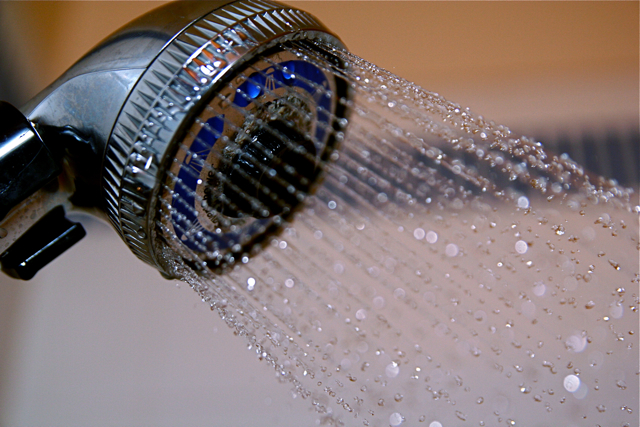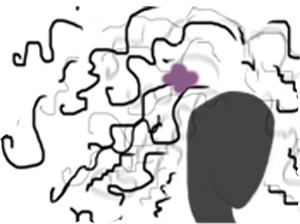
Hard Water, Hardly A Problem?
Hard work spotlights the character of people: some turn up their sleeves, some turn up their noses, and some don’t turn up at all.” ~ Sam Ewing
It was like some strange unsolved mystery. Each and every time I stepped into the shower at my SO’s house, the water gently ran through my hair like silk. I only had to use minimal product to produce a lather, and I could detangle my natural hair practically with just water. Yes, with just water! After styling, I got the best hair day ever!
When I flashed forward a few days and repeated the process at home, my hair was just … average. What was going on? Well, after repeating these cycles, I came to the conclusion. Dum, dum, duuuum! Good ol’ H2O.
Water can have a major impact on your products’ effectiveness as well as on your hair, particularly naturally curly hair. These results are often dependent on whether or not your water is hard or soft. Yes, we’re still talking about water here. Hard water is often known as containing larger amounts of minerals than its softer version. This mineral content varies based on your location and how the water is purified and processed. Minerals also have the potential of building up on natural hair, thereby drying it out.
Telltale Signs That Your Water Is Hard
NaturallyCurly lists a few telltale signs to know whether your water is on the hard side. The effects of hard water on natural hair include: “Cloudy, spotty dishes coming out of the dishwasher; diminished performance of coffeemakers; and clogged or broken pipes and washing machines with an unpleasant odor that don’t work properly and turn clothes and towels dingy grey or a rust-tinged color.” Sounds familiar?
Spotting Soft Water
Unlike hard water, soft water has many benefits for afro hair. It has zero-to-minimal amounts of magnesium and calcium. “It can be soothing to bathe in, but rinsing with it will make you feel like you still have a layer of soap on your skin,” according to Livestrong.
When Faced With Hard Knocks
There are a couple of things you can do to alleviate or eliminate the effects of hard water on your curly mane.
1. Swap out your regular showerhead and replace it with a showerhead water filter. Just like drinking water filters, these showerheads filter out minerals and other substances, thereby softening your water.
I did this with my showerhead at home and noticed a slight improvement. Word for the wise: remember to replace your showerhead filter as needed. It’s easy to forget! I can’t remember the brand I used, but I purchased it from Lowe’s. You can also find them at hardware stores.
However, Aquasana’s showerhead filter is known as one of the best water softeners for African-American hair. It has consistently strong reviews and cost approximately $70. Aquasana is not the most aesthetically pleasing tool, but it’s known to be effective. According to the company, it “removes harmful synthetic chemicals and chlorine in your water to give you softer skin and shinier hair for the cleanest, healthiest showering experience.”
If you want to really improve your water quality and make it truly softer, install a whole house water filter system. These systems claim to remove iron and range in price from $50 to $1,000.
2. Use a chelating shampoo to remove mineral buildup on your hair. These are the best shampoos for hard water. They contain a key ingredient—ethylenediamine tetraacetic acid (EDTA), which “were developed to counteract the effects of hard water and heavy metal ions in the manufacture of textiles. These metal chelators are widely used in cosmetics and personal care products, in food, and in medicines. By binding with metal ions, these ingredients prevent the metals from being deposited onto the hair, scalp and skin,” according to cosmeticsinfo.org.
Chelating shampoos are pretty harsh and will strip your hair of moisture. Be sure to follow them with a moisturizing conditioner like Hello Hydration and use them no more than every other week, if needed.
I keep hearing rave reviews about Joico K-PAK Chelating Shampoo. “This triple-action chelating shampoo is an intense clarifying shampoo that cleanses the hair, removes mineral deposits and styling product buildup,” according to its package. This shampoo costs approximately $14 and can be found at your local Walgreens, or you can purchase it through my link.
3. According to a couple of hair forums, coconut and argan oils can chelate iron and copper, once again preventing your hair from losing moisture. Not to mention that applying oils to your curly mane also has several benefits.

Photo credit: stevendepolo
Into DIY methods? Many curlies have found success trying the following rinses.
- Club soda rinses are effective and should be rinsed out of your hair once the fizzing stops. Not into using soda? Heck, bottoms up!
- Apple cider vinegar (ACV) rinses remove buildup, restores your pH balance, treats dandruff, and closes the cuticle. Just be careful not to overdo it, as ACV is highly acidic, which can actually damage your hair with excessive use. On its own, ACV smells … deadly, but the smell does fade once washed out of your hair. Combine 1tbsp of ACV to every cup of distilled water. After shampooing, apply the rise. Wait a few seconds before rinsing with cold water, which will further help to seal the cuticles of your hair. Want a bit more moisturizing brew? Add honey and/or aloe vera gel.
- Water and baking soda rinses cleanse and remove buildup from the hair. Baking soda aka sodium bicarbonate works great as a replacement for shampoos. Combine 2 tablespoons of Baking Soda with a cup of water, pour the mix onto your hair, wait a few minutes, and rinse. You’re good to go!
Some curlies have tried baking soda washes followed by vinegar rinses. Just be careful. Too much of anything is overkill, especially for your natural hair. For me, I’ll seize each and every moment to use soft water as I get it!






Recent Comments